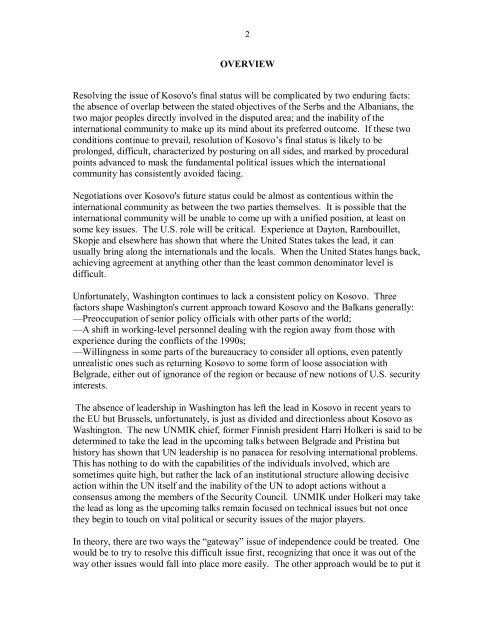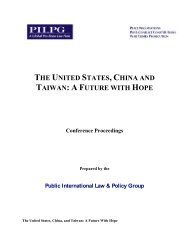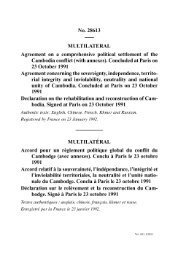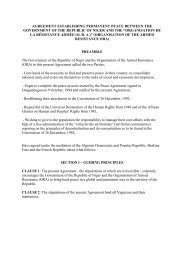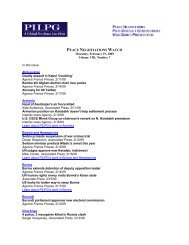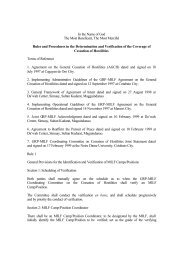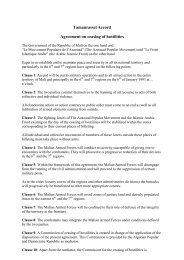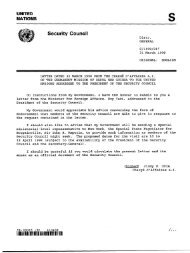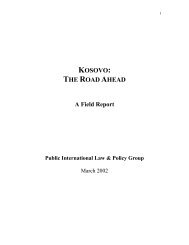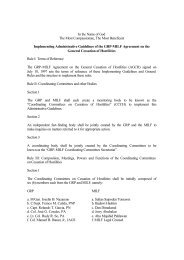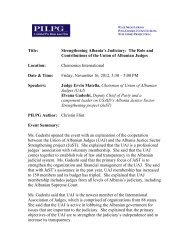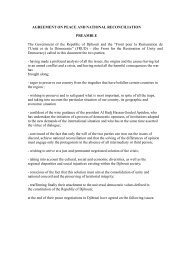Kosovo Albanian Delegation Negotiation Briefing Packet
Kosovo Albanian Delegation Negotiation Briefing Packet
Kosovo Albanian Delegation Negotiation Briefing Packet
You also want an ePaper? Increase the reach of your titles
YUMPU automatically turns print PDFs into web optimized ePapers that Google loves.
2<br />
OVERVIEW<br />
Resolving the issue of <strong>Kosovo</strong>'s final status will be complicated by two enduring facts:<br />
the absence of overlap between the stated objectives of the Serbs and the <strong>Albanian</strong>s, the<br />
two major peoples directly involved in the disputed area; and the inability of the<br />
international community to make up its mind about its preferred outcome. If these two<br />
conditions continue to prevail, resolution of <strong>Kosovo</strong>’s final status is likely to be<br />
prolonged, difficult, characterized by posturing on all sides, and marked by procedural<br />
points advanced to mask the fundamental political issues which the international<br />
community has consistently avoided facing.<br />
<strong>Negotiation</strong>s over <strong>Kosovo</strong>'s future status could be almost as contentious within the<br />
international community as between the two parties themselves. It is possible that the<br />
international community will be unable to come up with a unified position, at least on<br />
some key issues. The U.S. role will be critical. Experience at Dayton, Rambouillet,<br />
Skopje and elsewhere has shown that where the United States takes the lead, it can<br />
usually bring along the internationals and the locals. When the United States hangs back,<br />
achieving agreement at anything other than the least common denominator level is<br />
difficult.<br />
Unfortunately, Washington continues to lack a consistent policy on <strong>Kosovo</strong>. Three<br />
factors shape Washington's current approach toward <strong>Kosovo</strong> and the Balkans generally:<br />
—Preoccupation of senior policy officials with other parts of the world;<br />
—A shift in working-level personnel dealing with the region away from those with<br />
experience during the conflicts of the 1990s;<br />
—Willingness in some parts of the bureaucracy to consider all options, even patently<br />
unrealistic ones such as returning <strong>Kosovo</strong> to some form of loose association with<br />
Belgrade, either out of ignorance of the region or because of new notions of U.S. security<br />
interests.<br />
The absence of leadership in Washington has left the lead in <strong>Kosovo</strong> in recent years to<br />
the EU but Brussels, unfortunately, is just as divided and directionless about <strong>Kosovo</strong> as<br />
Washington. The new UNMIK chief, former Finnish president Harri Holkeri is said to be<br />
determined to take the lead in the upcoming talks between Belgrade and Pristina but<br />
history has shown that UN leadership is no panacea for resolving international problems.<br />
This has nothing to do with the capabilities of the individuals involved, which are<br />
sometimes quite high, but rather the lack of an institutional structure allowing decisive<br />
action within the UN itself and the inability of the UN to adopt actions without a<br />
consensus among the members of the Security Council. UNMIK under Holkeri may take<br />
the lead as long as the upcoming talks remain focused on technical issues but not once<br />
they begin to touch on vital political or security issues of the major players.<br />
In theory, there are two ways the “gateway” issue of independence could be treated. One<br />
would be to try to resolve this difficult issue first, recognizing that once it was out of the<br />
way other issues would fall into place more easily. The other approach would be to put it


